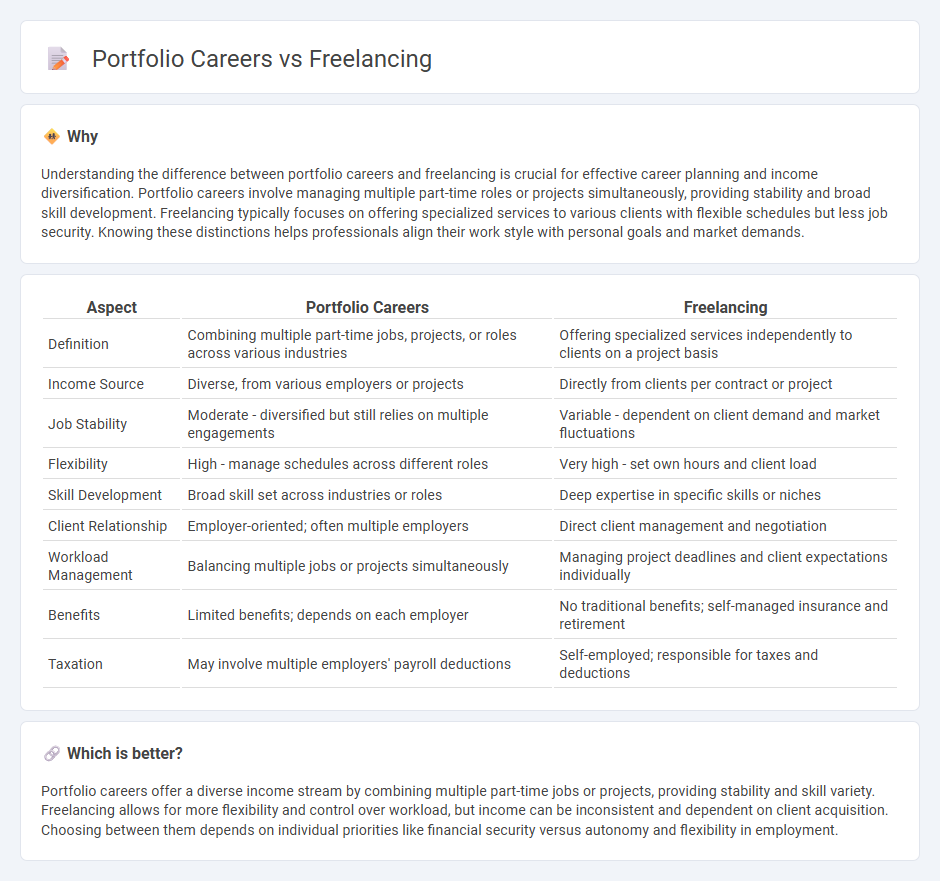
Portfolio careers allow professionals to engage in multiple part-time roles or projects across varied industries, providing diverse income streams and skill development. Freelancing focuses on offering specialized services independently, often with project-based contracts and flexible schedules. Explore the distinctions to determine which career path aligns best with your goals.
Why it is important
Understanding the difference between portfolio careers and freelancing is crucial for effective career planning and income diversification. Portfolio careers involve managing multiple part-time roles or projects simultaneously, providing stability and broad skill development. Freelancing typically focuses on offering specialized services to various clients with flexible schedules but less job security. Knowing these distinctions helps professionals align their work style with personal goals and market demands.
Comparison Table
| Aspect | Portfolio Careers | Freelancing |
|---|---|---|
| Definition | Combining multiple part-time jobs, projects, or roles across various industries | Offering specialized services independently to clients on a project basis |
| Income Source | Diverse, from various employers or projects | Directly from clients per contract or project |
| Job Stability | Moderate - diversified but still relies on multiple engagements | Variable - dependent on client demand and market fluctuations |
| Flexibility | High - manage schedules across different roles | Very high - set own hours and client load |
| Skill Development | Broad skill set across industries or roles | Deep expertise in specific skills or niches |
| Client Relationship | Employer-oriented; often multiple employers | Direct client management and negotiation |
| Workload Management | Balancing multiple jobs or projects simultaneously | Managing project deadlines and client expectations individually |
| Benefits | Limited benefits; depends on each employer | No traditional benefits; self-managed insurance and retirement |
| Taxation | May involve multiple employers' payroll deductions | Self-employed; responsible for taxes and deductions |
Which is better?
Portfolio careers offer a diverse income stream by combining multiple part-time jobs or projects, providing stability and skill variety. Freelancing allows for more flexibility and control over workload, but income can be inconsistent and dependent on client acquisition. Choosing between them depends on individual priorities like financial security versus autonomy and flexibility in employment.
Connection
Portfolio careers and freelancing are interconnected through their emphasis on diverse skill sets and multiple income streams, allowing professionals to work on varied projects across different industries. Freelancers often build portfolio careers by combining short-term contracts, consulting gigs, and creative endeavors into a cohesive professional identity. This flexible work model enhances job security and personal growth by leveraging a broad network and continuous skill development.
Key Terms
Autonomy
Freelancing offers high autonomy by allowing professionals to choose projects, set their schedules, and manage client relationships independently. Portfolio careers combine multiple part-time roles or freelance gigs, providing diversified income streams while maintaining control over work-life balance and career direction. Explore how autonomy shapes career satisfaction and productivity in freelancing versus portfolio careers.
Multiple Income Streams
Freelancing often involves offering specialized services to various clients, generating income through project-based work, while portfolio careers combine multiple part-time roles, freelance gigs, and entrepreneurial ventures to diversify earnings. Both approaches emphasize multiple income streams, reducing financial risk and increasing professional flexibility in dynamic job markets. Explore how these career models can create resilient and diversified income pathways tailored to your skills.
Skill Diversification
Freelancing offers flexibility with project-based work, allowing professionals to specialize in specific skills while managing multiple clients independently. Portfolio careers emphasize skill diversification by combining various roles or jobs across different fields, enhancing adaptability and broadening expertise. Explore how embracing skill diversification can maximize your career resilience and opportunities.
Source and External Links
Freelancing 101: What is Freelancing? - Freelancing is a form of self-employment where you work independently for multiple clients without exclusivity, offering various skills and enjoying flexibility in location and schedule.
What Is Freelancing? Basics and Popular Jobs in 2025 - Freelancing involves doing specific work for clients without full-time commitment, and beginners can start by picking a niche, building a portfolio, setting rates, and promoting themselves professionally.
25 best freelance websites to find work in 2025 - Freelancing is a flexible work style offering freedom to choose projects and clients, with many platforms available for beginners to build their brand and find freelance jobs online.
 dowidth.com
dowidth.com